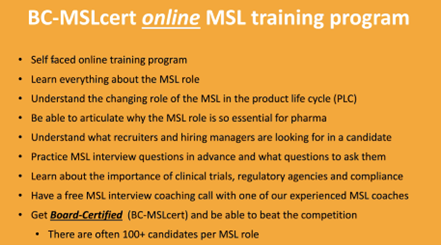By: Adriana Jones
What is an MSL?
After attending a career panel held by the Rutgers SGS iJOBS, I gained great perspective on the life of a Medical Science Liaison (MSL). MSLs share their knowledge on the science of different therapeutics and meet interesting people throughout their travels! While you keep up to date in your field of expertise (pathogenesis, medications, competitors), you facilitate the exchange of scientific information such as mechanism of action or updates on clinical trials.
What are some of the responsibilities of an MSL?
The responsibilities of an MSL differ from company to company. They may be responsible for monitoring a drug through its Pre-Launch (Phase 1-3 clinical trials), Launch, or Post-Launch Phase. During its Pre-Launch you may need to focus more on contributing to the scientific research and collaborating with Research and Development (R&D). During the Launch, you may be responsible for training salespeople and speakers, such as health care providers (HCPs) and key opinion leaders (KOLs), or leading experts in the field who give promotional talks. Meeting and interacting with KOLs involves capitalizing on your professional network while utilizing strong communication/intrapersonal skillsets. MSLs also meet with advisory boards to discuss the background science, data, and gaps of knowledge or assist with marketing for strategy. Lastly, with
Post-launch, you want to evaluate results with long term studies, small pilot studies for possible new indications, or focus groups including medical information inquiries.
Do MSLs focus on only one drug at a time through its clinical phases?
Again, the responsibilities of an MSL differ from company to company. However, it is very common for an MSL to cover all the drugs through all its phases for a given therapeutic area. Typically, an MSL within a therapeutic area will be an expert in all drugs of that area.
What is the difference between an MSL and a TBM (territory business manager)?
An MSL does not equate to “salesperson”. There is no bonus with every prescription written and typically an MSL meets 1-2 times a year while a TBM may meet with KOL’s and HCP’s weekly. In addition, salespeople are limited to discussion within labeling, also known as “on label” while MSL’s can talk “off label”. “On label” referring to compliance with what it written on the prescription packet insert that the FDA determines what can and cannot be communicated with health care providers.
How often do MSL’s serve as speakers in conferences?
Some smaller companies may allow MSLs to speak but usually health care providers and KOLs serve as the primary speakers in conferences. In this instance, usually MSLs train KOL’s or use a third party to assist in training the speakers. With respect to preparing the speech, fellow colleagues from medical communications and writers usually assist with the slides, and standard response letters can be written by the medical information group.
How would you define some of the differences between working at big vs small pharmaceutical companies as an MSL?
In small pharma, you have a variety of tasks that you are responsible for, including “start-up” tasks and pilot studies. Some “start-up” tasks might include defining your territory, making introductory calls to assess needs, or figuring out the logistics of how you want to communicate with KOLs according to their schedules. However, with big pharma there is more pressure on metrics and keeping up with the competition. For example, upper management might be more demanding with your number of outreaches and successful contacts.
There are 5 essential skills I learned can propel a candidate to the top of the hiring list:
- Knowledge and Ability – Your credentials and education speak volumes to your ability to communicate complex scientific information to any individual, with or without expertise.
- Having an Inquisitive Nature – Being able to lead a conversation to uncover client “needs” and concerns is a helpful skill. This helps bring value to the relationship while taking into account the client’s availability to meet.
- Solid Communication Skills – As you communicate with various clients, your ability to express verbal and written information is vital to their full understanding of the science.
- Relatable or having Social Intelligence – Sometimes, it is as easy as being relatable to an individual which can open up the floor to seamless communication.
- Being Perseverant above all! – If it seems easy to give up and quit when things are not going your way, then an MSL role might not be the one for you.
As an MSL, some KOL’s talk more than others and meet more often than others. Figuring out a “style” and how to bring value to a KOL is paramount.
International MSL Fellowship opportunity through Rutgers iJOBS with FSTP (from science to pharma):
Rutgers is providing 2 paid fellowships for candidates interested in the MSL career path. This competitive program includes $900 worth of training culminating in a BC-MSL Certification. Please see details below provided by Rutgers iJOBS.

The application deadline occurs every quarter, and iJOBS generally accepts 1-2 students for the fellowship as part of Phase 2 of the iJOBS program. The program does have an app to learn the lessons at your convenience. The program is self-paced and can be spread over 1 to 1.5 years or 4-6 hours per week.
Please refer to link below and contact Janet Alder to receive the application.
- Applications require PI approval and knowledge of the program
- https://www.fromsciencetopharma.com/msl-fellowship-application-page
Some concluding Key Tidbits:
- The MSL Society is a great resource for more information
- The fellowship course is a great learning and networking opportunity to put on your resume.
- It’s already tough to break in, so applying for the fellowship will only help.
- Internal referrals are always helpful!
This article was edited by Senior Editors Samantha Avina and Natalie Losada.